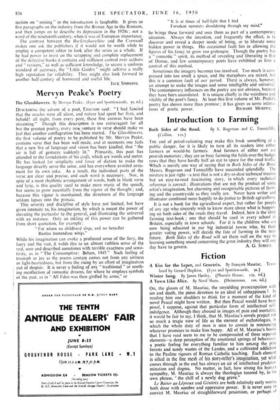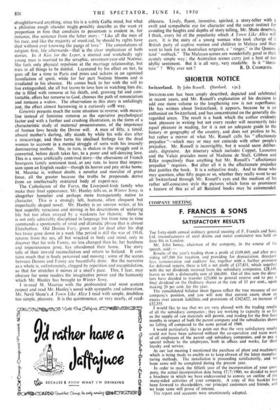Fiction
OH, the gloom of M. Mauriac, the unyielding preoccupation with sin and death, the pious devotion to an ideal of unhappiness ! In reading him one shudders to think for a moment of the kind of novel Pascal might have written. But then Pascal would have been proof, I suppose, against that particular form of intellectual sell indulgence. Although they abound in images of pain and mortality, it would be fair to say, I think, that M. Mauriac's novels project not so much a tragic view of life as the sternest of eschatologies, in which the whole duty of man is seen to consist in renouncing whatever promises to make him happy. All of M. Mauriac's books that I have read seem to me to be compounded of three separate elements—a deep perception of the emotional springs of behaviour, a poetic feeling for everything familiar to him among the pine forests and sandy wastes of the Landes, and a cultivated addiction to the Pauline rigours of Roman Catholic teaching. Each element is sifted in the fine mesh of his story-teller's imagination, yet what comes through in the end has always an air of intellectual predeter- mination and dogma. No matter, in fact, how strong his humal sympathy, M. Mauriac is always the theologian tutored by, in his own phrase, " the chill of a newly dug grave."
Le Balser au Lepreux and Genitrix are both relatively early works, both done with sombre and oppressive power. It is never easy to convict M. Mauriac of straightforward pessimism, or perhaps of straightforward anything, since his is a subtle Gallic mind, but what a philistine rough islander mig4.possibly describe as the want ct proportion in him that conduces to pessimism is evident in, for instance, this sentence from the latter story : " Like all the men of his race, and like the majority of mankind, he should by rights have died without ever knowing the pangs of love." The consolations of religion first, life afterwards—that is the clear implication of both stories. In A Kiss for the Leper, a stunted and wretchedly ugly young man is married to the seraphic, seventeen-year-old Noemie. She feels only physical repulsion at the marriage relationship, but tries in all things to be dutiful. Lacerated by his effect on her, he goes off for a time to Paris and pines and sickens in an agonised humiliation of spirit, while for her part Nodmie blooms and is irradiated in his absence. He comes back to her with the will to live extinguished, she all but learns-to love him in watching him die, she is filled with remorse at his death, and, growing fat and com- fortable, offers her remorse to God, chooses the path of renunciation and remains a widow. The observation in this story is unfailingly just, the effect almost harrowing in a curiously corn way.
Genetrix presents much the same situation in reverse, with mascu- line instead of feminine remorse as the operative psychological factor and with a further and crushing illustration, in the form of a characteristic study of maternal possessiveness, of the impotence of human love beside the Divine will. A man of fifty, a timid, absurd mother's darling, idly stands by while his wife dies after a miscarriage, and then turns his idealised feelings for the dead woman to account in a mental struggle of sorts with his insanely• domineering mother. She, in turn, is shaken in the struggle and is converted, before death takes her, to a purer and self-denying love. This is a more artificially contrived story—the obsessions of French bourgeois family sentiment tend, at any rate, to leave that impres- sion upon an English reader—though its horror and pity strike home. M. Mauriac is, without doubt, a novelist and moralist of great force, all the greater because the truths he propounds derive from an intellectually restricted body of experit nee.
The Catholicism of the Furys, the Liverpool-Irish family who make their final appearance, Mr. Hanley tells us, in Winter Song, is altogether homelier and perhaps more transparently native to character. This is a strongly felt, humane, often eloquent but imperfectly shaped novel. Mr. Hanley is an uneven writer, at his best superbly veracious and stirring in his descriptions of seafaring life but too often swayed by a weakness for rhetoric. Here he is not only admirably disciplined in language but from time to time commands a spontaneity of vivid and dramatic phrase that is almost Elizabethan. Old Dennis Fury, given up for dead after his ship has twice gone down in a week (the period is still the war of 1914), returns from the sea, all but wrecked in body and mind. only to discover that his wife Fanny, no less changed than he, her hardness and imperiousness gone, has abandoned their home. The story tells of their inward reconciliation and return to Ireland. It con- tains much that is finely perceived and moving ; some of the scenes between Dennis and Fanny are beautifully done. But the narrative as a whole is, unfortunately, clogged by repetition and recapitulation, so that for stretches it moves at a snail's pace. This, I fear, may obscure for some readers the imaginative power and the humanity which Mr. Hanley has brought to Winter Song.
I re-read M. Mauriac with the profoundest and most austere respect and read Mr. Hanley's novel with sympathy and admiration. Mr. Nevi! Shute's A Town Like Alice I read with simple, doubtless too simple, pleasure. It is the quintessence, or very nearly, of read- ableness. Lively, fluent, inventive, spirited, a story-teller with a swift and sympathetic eye for character and the surest instinct for avoiding the heights and depths of story-telling, Mr. Shute deserves, I think, every bit of, the popularity which A Town Like Alice will earn. it is the story of a young woman who took charge of a British party of captive women and children in Malaya and then went to look for an Australian sergeant, a " ringer," in the Queens. land " outback." The Malayan scenes are wonderfully good in their acutely simple way ; the Australian scenes carry just a hint of too idyllic sentiment. But it is all very, very readable. Is it " litera-





































 Previous page
Previous page